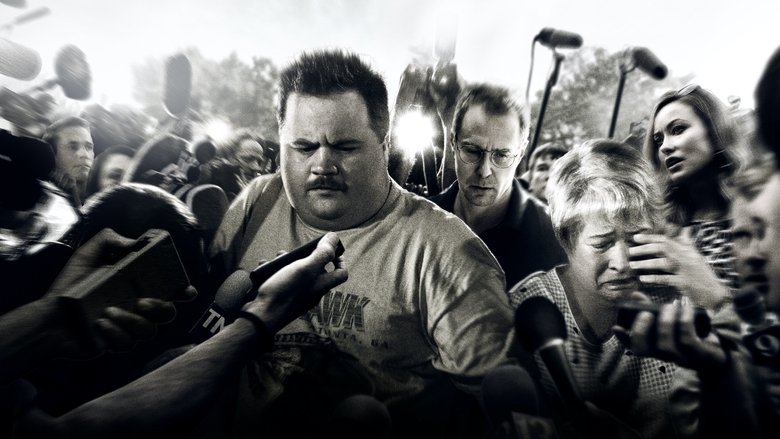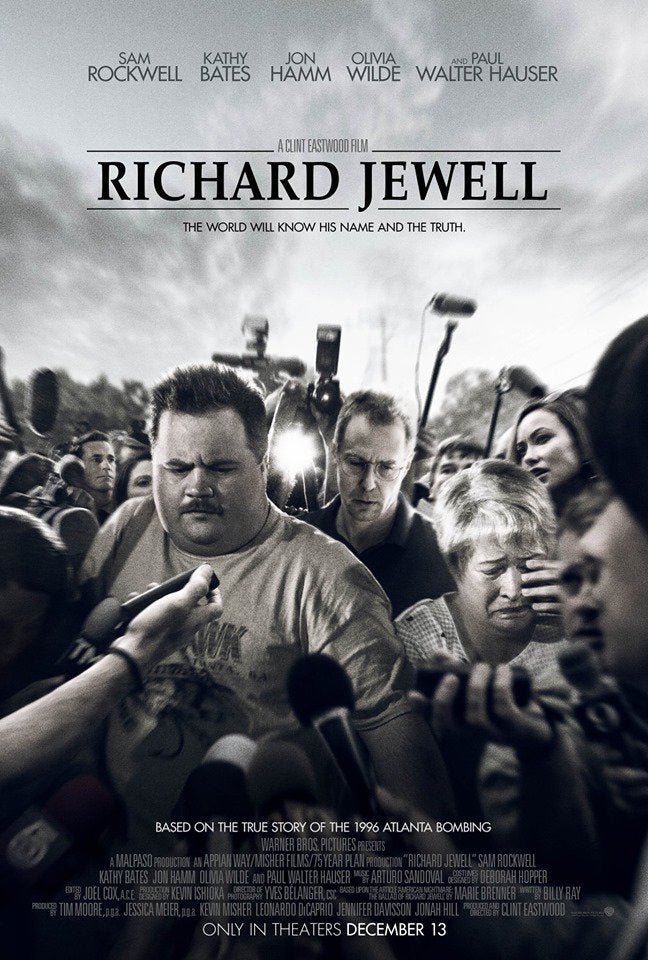← Back to Reviews

in
Richard Jewell
Director Clint Eastwood hits a bullseye with 2019's Richard Jewell, a riveting docudrama centered around an average Joe that documents how slow the wheels of justice often turn and how sometimes, with an assist from the media, can grind to a complete halt.

The title character is an overweight, simple-minded soul who lives with his mother who has just gotten a job as a security guard at the 1996 Olympics in Atlanta. During a musical event in Centennial Park, Richard actually discovers a bomb hidden under a tower and his discovery leads to thousands of lives being saved and his being hailed as a hero. However, as the FBI begins investigating the planting of the bomb, we are shocked as Richard comes into focus as their prime suspect.

Eastwood and screenwriter Billy Ray have mounted a compelling story centered around a completely likable character while establishing through efficient backstory why Jewell is moved so quickly from hero to suspect. It's established in the opening scenes that Jewell has always been fascinated with the law and law enforcement and, at one time, probably tried to become a police officer and couldn't. We observe him get fired as college security guard, which actually ends up being the impetus for the entire investigation.

As we watch this investigation roll across the screen, it's aggravating watching the way this man was completely railroaded without any compelling evidence. The viewer is aware of his innocence and it takes his lawyer and a lady reporter about five minutes to figure out that he's innocent, but for some reason, the entire FBI is unable to figure it out, thinking that he must have had an accomplice because he was far enough away from the explosion when it occurred that he didn't get hurt. It's also heartbreaking watching how what happens to Jewell affects his relationship with his mother. The scene where the FBI tear their home apart and remove most of their possessions to exam them is harrowing.

Eastwood's meticulous direction is a big plus here, providing small details that enhance the reality of the proceedings. I love the two scenes with the lady reporter in her office, one in triumph as she thinks she has exposed Richard and the other as she is read the riot act by Richard's lawyer. I also love as Richard is about to begin his final encounter with the FBI and notices a mail cart similar to the one he pushed around at the law office where he used to work.

As always, Eastwood's attention to production values is on the money, with special nods to cinematography and editing. Eastwood also obtains rich performances from his hand-picked cast...Paul Walter Hauser gives a star making performance in the title role, offering more than one moment in the performance that will leave a lump in the throat. Oscar winner Sam Rockwell offers another one of his slick performances as Jewell's lawyer and Kathy Bates earned her 4th Oscar nomination for her devastating work as Richard's mother. Olivia Wilde is surprisingly effective as a the lady reporter, a role that I kept picturing Jennifer Jason Leigh in. The film contains virtually no music score and we don't miss it at all. Eastwood trusts the power of his story to set the mood of the proceedings and said power delivers.
Director Clint Eastwood hits a bullseye with 2019's Richard Jewell, a riveting docudrama centered around an average Joe that documents how slow the wheels of justice often turn and how sometimes, with an assist from the media, can grind to a complete halt.

The title character is an overweight, simple-minded soul who lives with his mother who has just gotten a job as a security guard at the 1996 Olympics in Atlanta. During a musical event in Centennial Park, Richard actually discovers a bomb hidden under a tower and his discovery leads to thousands of lives being saved and his being hailed as a hero. However, as the FBI begins investigating the planting of the bomb, we are shocked as Richard comes into focus as their prime suspect.

Eastwood and screenwriter Billy Ray have mounted a compelling story centered around a completely likable character while establishing through efficient backstory why Jewell is moved so quickly from hero to suspect. It's established in the opening scenes that Jewell has always been fascinated with the law and law enforcement and, at one time, probably tried to become a police officer and couldn't. We observe him get fired as college security guard, which actually ends up being the impetus for the entire investigation.

As we watch this investigation roll across the screen, it's aggravating watching the way this man was completely railroaded without any compelling evidence. The viewer is aware of his innocence and it takes his lawyer and a lady reporter about five minutes to figure out that he's innocent, but for some reason, the entire FBI is unable to figure it out, thinking that he must have had an accomplice because he was far enough away from the explosion when it occurred that he didn't get hurt. It's also heartbreaking watching how what happens to Jewell affects his relationship with his mother. The scene where the FBI tear their home apart and remove most of their possessions to exam them is harrowing.
Eastwood's meticulous direction is a big plus here, providing small details that enhance the reality of the proceedings. I love the two scenes with the lady reporter in her office, one in triumph as she thinks she has exposed Richard and the other as she is read the riot act by Richard's lawyer. I also love as Richard is about to begin his final encounter with the FBI and notices a mail cart similar to the one he pushed around at the law office where he used to work.

As always, Eastwood's attention to production values is on the money, with special nods to cinematography and editing. Eastwood also obtains rich performances from his hand-picked cast...Paul Walter Hauser gives a star making performance in the title role, offering more than one moment in the performance that will leave a lump in the throat. Oscar winner Sam Rockwell offers another one of his slick performances as Jewell's lawyer and Kathy Bates earned her 4th Oscar nomination for her devastating work as Richard's mother. Olivia Wilde is surprisingly effective as a the lady reporter, a role that I kept picturing Jennifer Jason Leigh in. The film contains virtually no music score and we don't miss it at all. Eastwood trusts the power of his story to set the mood of the proceedings and said power delivers.
